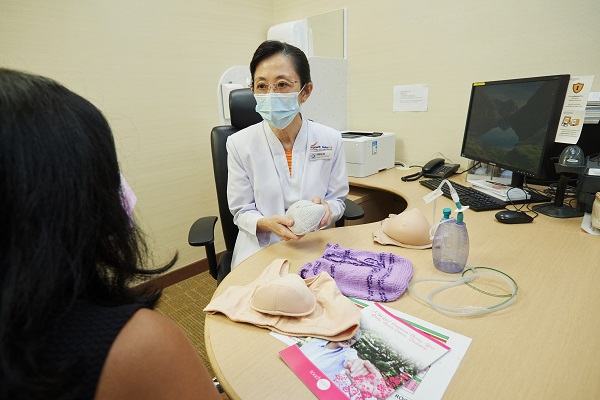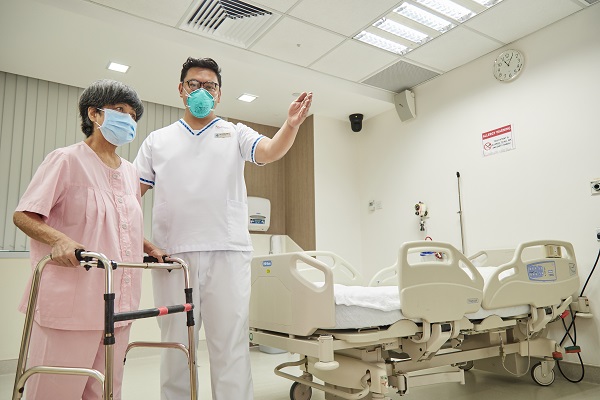Besides being adept at what they do, these nurses, with their extraordinary passion and heart for providing care, spare no effort in improving the life of every patient who crosses their paths.
Powering a close-knit community

An oncology-trained nurse who has been working in KK Women's and Children's Hospital (KKH) since 2004, Teresa Ng, Assistant Director of Nursing, KK Women’s and Children’s Hospital (KKH), has a heart for breast cancer patients.
Her dedication to cancer patients began when she was just a teenager taking care of her father who had liver cancer. Her father's illness drove Teresa to pursue a career in nursing so she could make a difference in the lives of patients with cancer.
Today, the biggest challenge for Teresa is getting patients to come to terms with their cancer diagnosis so that they receive timely treatment. When patients are in denial, she helps them understand the disease and treatment process, and supports them with evidence-based facts on how breast cancer is treatable and has high survival rates.
In addition to seeing inpatients and running an outpatient clinic, Teresa chairs a breast cancer support group, KK Alpine Blossoms Breast Cancer Support Group, at KKH — a role she has embraced since 2009.
"Patients need support and reassurance not just during diagnosis and treatment, but also after recovery, as there is always a fear of relapse. This is where the support group comes in handy and it is something I am passionate about," she said.
The support group runs a Blossom Buddy programme, where volunteers, who are breast cancer survivors, share their experiences to help newly diagnosed patients come to terms with their condition. Teresa helps by addressing questions on treatment plans. The group also organises activities such as talks on nutrition and Traditional Chinese Medicine, exercise and dance classes, choir sessions, and initiatives in conjunction with the annual Breast Cancer Awareness Month. For its outstanding work in providing invaluable support to patients and caregivers, the group won the Singapore Health Inspirational Patient Support Group Award in 2016.
Teresa's other ventures include a project titled 'The Yarn Wonders', which won the Singapore Patient Engagement Initiative Award at the Singapore Patient Conference in 2018. The Yarn Wonders aims to provide a hand-knitted bag to hold surgical drainage bottles attached to patients after breast cancer surgery, so they can move around with ease. Funds raised from the sale of these bags knitted by the volunteers are donated to the KKH Health Fund to help patients in need and promote early detection of breast cancer. Recently, Teresa's team also completed the 'Knuckle Project', where they tested the feasibility of knitted prosthetics that can be customised to fit patients better.
The self-driven 56-year-old prides herself in doing things differently and is often brimming with ideas for her patients. Winning awards is a great motivation for her team, but her real joy comes from a simple 'hello' from patientswho have recovered after treatment.
Demystifying young-onset dementia

Linda Lim, Senior Nurse Clinician (APN) at National Neuroscience Institute (NNI), has been fascinated by how the brain works ever since her first encounter with neurosurgery during her first posting as a nurse at National University Hospital in 1997. She joined NNI in 2005 and was subsequently introduced to dementia as a possible area of specialisation just before she embarked on her Master of Nursing in 2010.
Prior to this, she, like most, had the misconception that dementia is “all about the elderly population being forgetful and getting lost”.
“I learned that there is so much more to dementia that I didn’t know, especially at NNI, where my focus is on youngonset dementia, which afflicts patients between the ages of 30 and 65,” she said.
Unlike elderly patients with cognitive impairment who display symptoms of dementia, the investigation and treatment for young-onset dementia is less straightforward. This is because younger patients may initially exhibit bizarre behaviour or have difficulty reading, and they tend to seek out a psychologist or an eye professional rather than a neurologist.
It could take some time before a patient with young-onset dementia develops memory impairment, and by the time they are referred to a neurologist, the condition may have already deteriorated greatly.
As the condition of each patient varies, Linda can spend up to two hours addressing the needs, challenges and concerns of both the patient and caregiver.
Before the COVID-19 pandemic, Linda was involved in organising large-scale events, such as public memory screening and forums, to raise awareness of dementia and youngonset dementia. The comprehensive public memory screening was a free hour-long one-to-one session, and the results were assessed by a team of doctors, nurses and psychologists.
Linda hopes that these screenings, which were very well received, can make a comeback soon, as they are an effective platform for getting the public to come forward to receive a cognitive assessment.
Linda Lim, Senior Nurse Clinician (APN) at National Neuroscience Institute, shares some symptoms of young-onset dementia: - Vision issues: difficulty reading and reaching for objects
- Speech issues: difficulty with word-finding and pronunciation
- Behaviour changes: Inappropriate social conduct, decline in personal hygiene, preference for sweets and carbohydrates
|
Keeping your heart healthy and happy

As an Advanced Practice Nurse (APN) in the Heart Failure team at National Heart Centre Singapore (NHCS), Elaine Ng sees patients whose ages range from 20s to 90s.
To date, the Heart Failure team has seen around 4,000 patients, and continues to care for about 1,000 of them through various programmes and consultations.
Elaine’s team oversees the more complicated cases, with some requiring the use of a left ventricular assist device (implanted in the patient’s chest to pump blood from the lower left heart chamber to the rest of the body) or a transplant.
Apart from clinical work, Elaine also offers a listening ear to patients who are having a hard time adjusting to their condition. She remembers a particular case of an elderly patient whose sole caregiver was his wife, which made her realise that more could be done in the community to help patients resume normality in their daily lives after discharge.
Like an answered prayer, a generous donation received last year allowed Elaine’s division to set up the Community Heart Programme in June 2021. Her team has since conducted 10 training workshops for community nurses and medical social workers. This year, teleconsultations with community nurses and medical social workers were kick-started for case discussions and easy access to advice on the management of heart failure patients. A selfmonitoring health kit for patients is also in the pipeline.
Optimistic that the programme will help forge close partnership with community nurses, Elaine is enthusiastic about taking community care for patients up a notch.
Personalising dementia care

Mohammad Najib Bin Ibrahim, Senior Staff Nurse, Ward 58 (Dementia Ward), Changi General Hospital, always knew that he wanted a meaningful job that can help people. Since completing his Advanced Diploma in Gerontology in 2019, he has done just that, as part of the multidisciplinary care team at the dementia ward in Changi General Hospital.
The team, comprising doctors, ward nurses and Allied Health Professionals, adopts a Person-Centred Care (PCC) model to care for dementia or elderly patients who are cognitively impaired. The individualised care plan aims to meet the patients’ needs based on their interests, remaining cognitive abilities, personal routines and preferences — an approach that focuses on the person with dementia, rather than the disease.
The PCC model of care begins with ward nurses like Najib getting to know the patient through an in-depth ‘knowing a person’ questionnaire with the family. This questionnaire sheds light on the patient’s lifestyle habits, preferences and hobbies, and aids the team in customising care for persons with dementia.
“For instance, pre-morbid sleeping habits may surface similarly to symptoms of sleep-wake reversal, and the PCC model of care helps avoid unnecessary medical intervention,” Najib explained.
Engagement is key for the patients’ well-being and reduction of behavioural issues. Through understanding the patients’ preferences and hobbies, activities such as music, art and gardening therapy can be customised to engage persons with dementia in a meaningful way as part of their care plans.
For nurses and caregivers looking after persons with dementia, it can be challenging as there is no real recovery in sight. Najib recounts an instance when he counselled a caregiver who was on the verge of burnout, as the patient regularly displayed behavioural issues. Najib encouraged her to see the patient’s behaviour as a result of the medical condition and care for him as the person he is, which helped her to view him from a different perspective.
“I think that treating every patient as an individual with his or her own personality encourages me and the team to keep caring despite the challenges, and continue my passion as a nurse,” Najib said.
To read more about how SingHealth nurses are pushing boundries to improve patient care, download the latest Singapore Health Special Nursing Supplement 2022.
